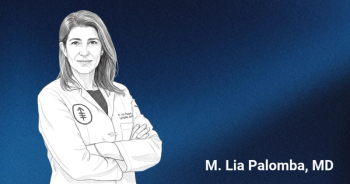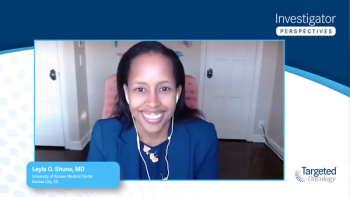
Future Directions for Treatment of Relapsed/Refractory Diffuse Large B-Cell Lymphoma
Laurie Sehn, MD, discusses the unmet needs and future directions in the treatment of relapsed/refractory diffuse large B-cell lymphoma.
Episodes in this series

Laurie Sehn, MD: What else are we looking forward to in the treatment of patients with relapsed/refractory DLBCL [diffuse large B-cell lymphoma]? We know that there are a large number of novel agents being tested in clinical trials. As you treat your patients, it’s also really important to consider what clinical trials your patient might have access to. One of the groups of drugs that we’re most interested in and will possibly become available in the short term for these patients are the bispecific monoclonal antibodies. There are several bispecific monoclonal antibodies in development for relapsed/refractory DLBCL.
These antibodies are aimed to target not only the B cell but also the T cell—simultaneously, with the goals of bringing the T cells right next to the B cells to induce an immune recognition and immune response to hopefully create a T cell activation that will then fight off the lymphoma. Bispecific antibodies are not approved for relapsed/refractory DLBCL, but they’re being tested in clinical trials. If your patient has access to clinical trials, it would be an important thing to consider, because they are showing quite a bit of promise.
What are some of the unmet needs for patients with relapsed/refractory DLBCL? It goes without saying that for patients who have relapsed/refractory disease, after our up-front standard therapy, they still remain a challenge. We know that things are certainly improving in terms of outcomes with the availability of novel combinations, as we talked about, but there are still patients who will prove to be refractory and require different approaches. CAR [chimeric antigen receptor] T-cell therapy is a cellular-based therapy approach that has also emerged to be very valuable.
Moving forward, it’s exciting to see that there are additional novel agents that will likely be coming out, including bispecific antibodies and novel cellular therapies that go beyond the current cellular therapies available. Off-the-shelf products, allogeneic CAR T cells, and dual-targeting CAR T cells all look very exciting. This patient with relapsed/refractory DLBCL went on to receive polatuzumab and BR [bendamustine, rituximab], achieved an excellent response, and remains in remission. I’m optimistic that if his disease unfortunately does recur in the future, on the plus side, I will have further options to offer him, and perhaps even more as the data continue to emerge.
This transcript has been edited for clarity.
Case Overview: A 76-Year-Old Man with R/R DLBCL
Initial presentation
- A 76-year-old man presented with progressive fatigue, enlarged lymph nodes in the neck and groin, pruritus and decreased appetite
- PMH: prediabetes, hypertension, medically controlled; BPH; osteoporosis
- PE: palpable cervical and inguinal lymphadenopathy; splenomegaly
- ECOG PS 2
Clinical workup
- Labs: Hb 9.9 g/dL; all others WNL
- Hepatitis B, C and HIV negative
- Excisional biopsy of the lymph node confirmed DLBCL
- IHC confirmed GCB subtype
- FISH panel: t(14;18) with a BCL2 rearrangement
- Flow cytometry: CD19-postitive
- Whole body PET/CT scan showed FDG avidity in the cervical and inguinal regions, largest node 3.8 cm; splenomegaly
- Ann Arbor stage III DLBCL
- IPI score intermediate-risk age > 60 years, stage 3
- PET scan shows diffuse lymphadenopathy
Treatment
- Treated with R-CHOP x 6 cycles; some dose reductions
- First post-treatment PET/CT scan was markedly improved; CR
- 6 months later there was active relapse of disease
- Repeat biopsy confirms R/R DLBCL, GCB subtype
- Patient is ineligible for high-dose chemotherapy followed by ASCT based on age and ECOG PS
- Initiated treatment with polatuzumab + bendamustine and rituximab




















